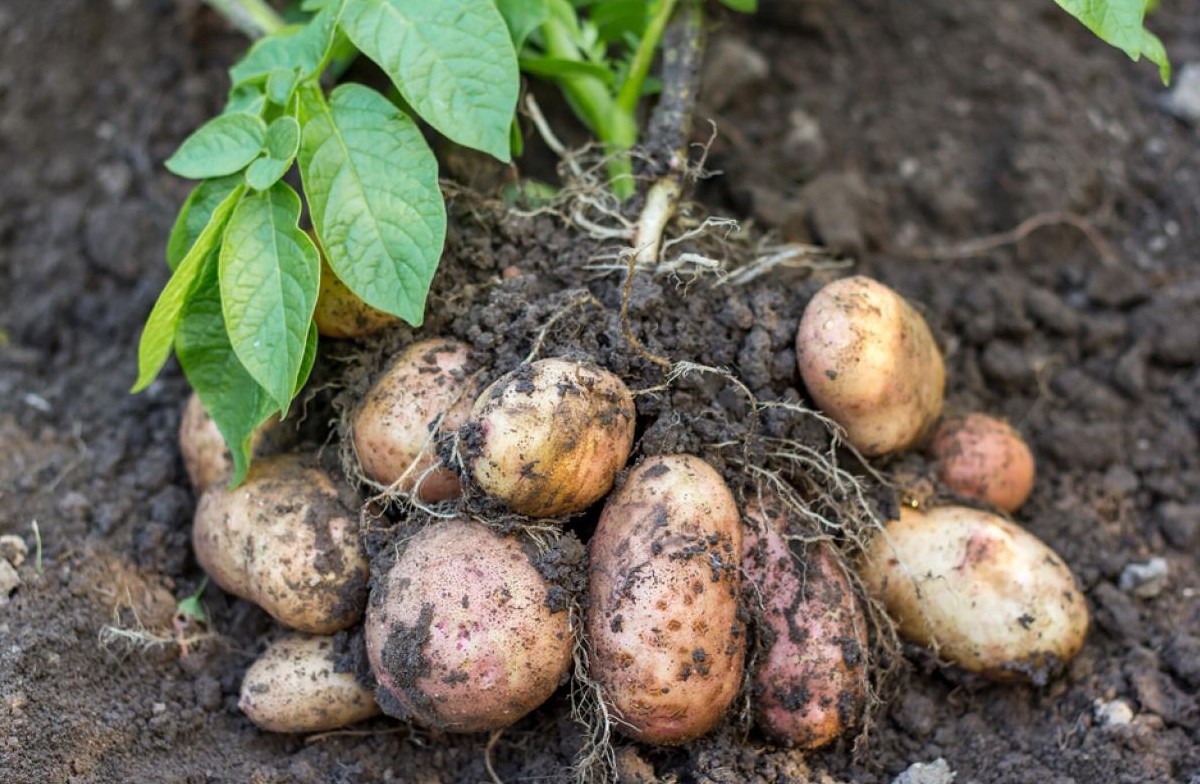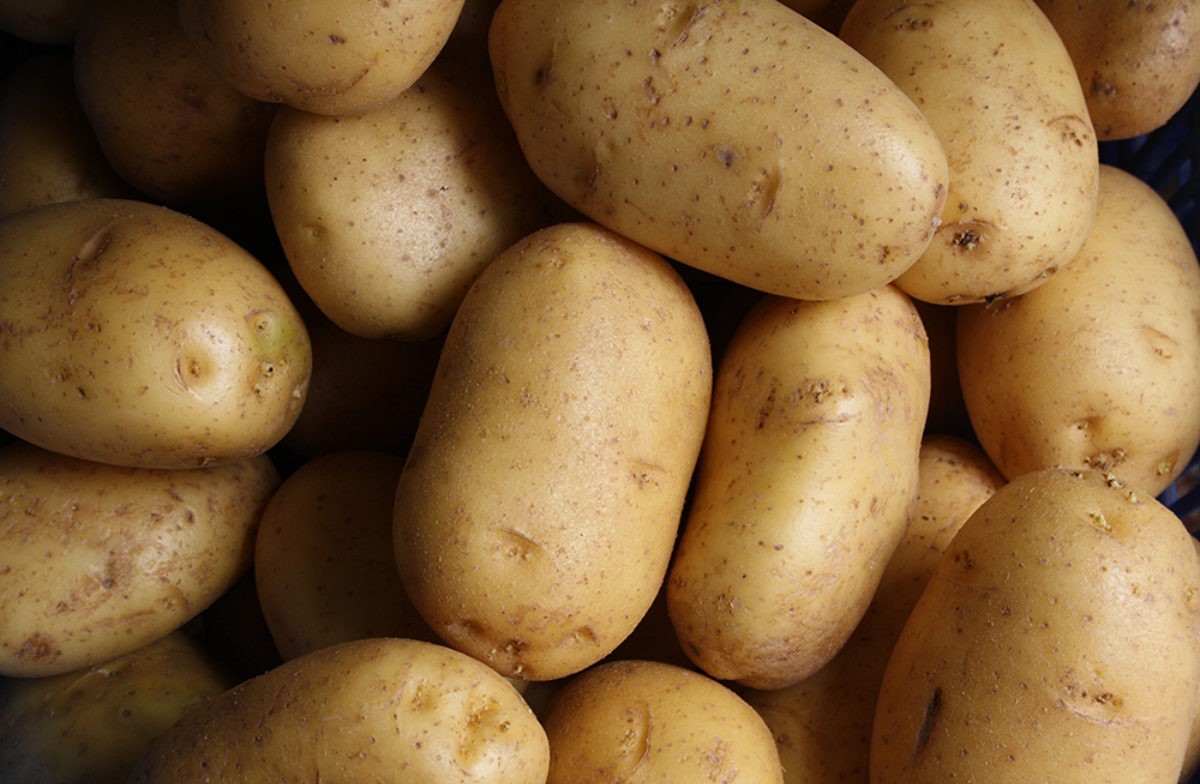Potato
The potato (Solanum tuberosum) is a herbaceous perennial plant that belongs to the nightshade family (Solanaceae). It is widely cultivated as a food crop all over the world, with over 3000 different varieties of potatoes grown globally.
The potato plant has a short stem and leaves that are arranged in a spiral pattern around the stem. The leaves are green and have a pointed shape. The plant produces small, white, star-shaped flowers that develop into small, green fruit that resemble tomatoes, but are not typically consumed.
The edible part of the potato plant is the underground tuber, which is a swollen, fleshy storage organ that contains starches, sugars, and other nutrients. The potato tubers come in different shapes, sizes, and colors, depending on the variety. They are a staple food in many cuisines and are used in a variety of dishes, including mashed potatoes, French fries, potato chips, and potato salad.
In natural health, the potato is not a commonly used herb or food for medicinal purposes. However, it is considered a neutral food with a sweet taste and is believed to have a nourishing effect on the body.
According to natural health principles, the potato is thought to be beneficial for the Spleen and Stomach meridians, which are responsible for digestion and nutrient absorption. The potato is also believed to have a cooling effect on the body, making it a good food to include in the diet during hot weather or if experiencing symptoms of internal heat or inflammation.
In addition, some natural health practitioners may recommend using poultices made from mashed potatoes or potato slices to treat skin conditions such as eczema or burns. The high water content and natural cooling properties of the potato are believed to help soothe inflammation and promote healing.
Potato nutritional benefits
Potatoes are a highly nutritious food that can provide a range of important vitamins, minerals, and other beneficial compounds. Some of the key nutritional benefits of potatoes include:
- Carbohydrates: Potatoes are a rich source of carbohydrates, which are the body's primary source of energy.
- Fiber: Potatoes are a good source of dietary fiber, which can help to support healthy digestion and prevent constipation.
- Vitamins: Potatoes are high in several important vitamins, including vitamin C, which supports the immune system, and vitamin B6, which plays a role in brain function and metabolism.
- Minerals: Potatoes are also a good source of minerals, such as potassium, which is important for heart health and muscle function, and iron, which is essential for the formation of red blood cells.
- Antioxidants: Potatoes contain a variety of antioxidants, including flavonoids and carotenoids, which can help to protect against cell damage and chronic diseases.
- Resistant starch: Potatoes are a good source of resistant starch, which is a type of carbohydrate that resists digestion in the small intestine and can provide several health benefits, such as improved insulin sensitivity and reduced inflammation.
Potato pharmacology
Potatoes are primarily known for their nutritional and culinary value rather than their pharmacological properties. However, there is some research suggesting that certain compounds found in potatoes may have potential pharmacological effects.
One of the key compounds found in potatoes is chlorogenic acid, which is a type of polyphenol that has been shown to have antioxidant, anti-inflammatory, and anti-cancer properties. Chlorogenic acid may also have a beneficial effect on blood sugar control and blood pressure.
Another compound found in potatoes is kukoamine, which is a type of amino acid that has been shown to have antihypertensive and cholesterol-lowering effects in animal studies.
Potatoes also contain small amounts of solanine and chaconine, which are toxic glycoalkaloids found in the potato plant. High levels of these compounds can be toxic to humans, causing symptoms such as nausea, vomiting, and diarrhea.
In Person With Heshoutang Natural Health Members
With Heshoutang Natural Health Online Members
Fill Out the Questionnaire by yourself
How to plant potato
Here are some general steps for planting potatoes:
- Choose seed potatoes: Select seed potatoes that are disease-free and have at least one "eye" or sprout. Seed potatoes can be purchased from a garden center or online.
- Prepare the soil: Potatoes prefer loose, well-draining soil that is rich in organic matter. Choose a sunny location and add compost or other organic matter to the soil to improve its texture and fertility.
- Cut and cure seed potatoes: If your seed potatoes are large, you may need to cut them into smaller pieces, making sure that each piece has at least one sprout. Let the cut pieces dry out for a day or two before planting to prevent rot.
- Plant seed potatoes: Dig a trench or individual holes, spaced about 12 inches apart and 4 inches deep. Place the seed potatoes in the holes or trench, with the sprouts facing up.
- Cover with soil: Cover the seed potatoes with soil, leaving about 2 inches of soil above the surface. As the potato plants grow, you can gradually add more soil to the trench or hill up the soil around the base of the plants to keep the developing tubers covered.
- Water and fertilize: Keep the soil evenly moist, but not waterlogged, throughout the growing season. You can also fertilize the plants with a balanced fertilizer or compost tea to promote healthy growth.
- Harvest: Potatoes are usually ready to harvest 2-3 months after planting. Carefully dig up the plants and remove the potatoes from the soil. Let the potatoes dry out for a few days before storing them in a cool, dark place.
Note: These are general steps and specific planting and care requirements may vary depending on your location and climate. Be sure to do some research on potato cultivation in your area before planting.
When you subscribe to the blog, we will send you an e-mail when there are new updates on the site so you wouldn't miss them.



















Comments